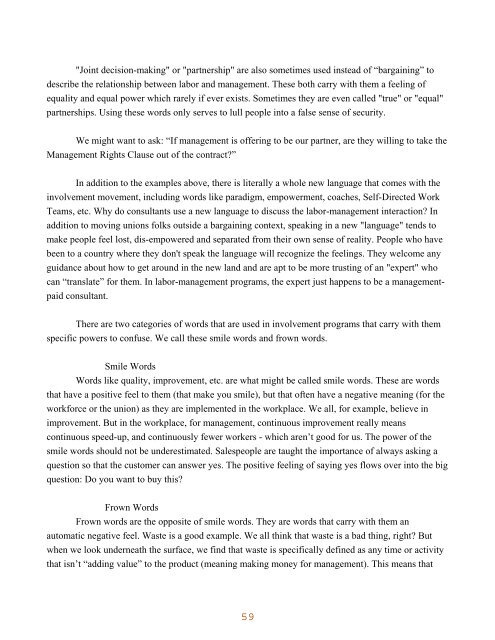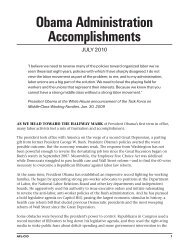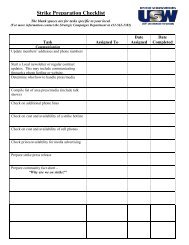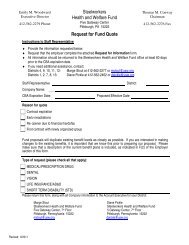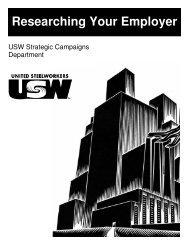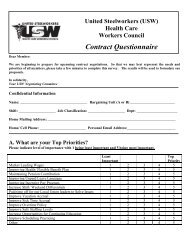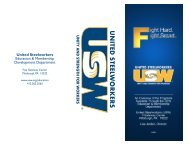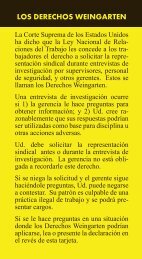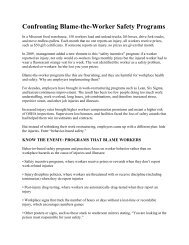Union Approach to Health and Safety: - United Steelworkers
Union Approach to Health and Safety: - United Steelworkers
Union Approach to Health and Safety: - United Steelworkers
Create successful ePaper yourself
Turn your PDF publications into a flip-book with our unique Google optimized e-Paper software.
"Joint decision-making" or "partnership" are also sometimes used instead of “bargaining” <strong>to</strong><br />
describe the relationship between labor <strong>and</strong> management. These both carry with them a feeling of<br />
equality <strong>and</strong> equal power which rarely if ever exists. Sometimes they are even called "true" or "equal"<br />
partnerships. Using these words only serves <strong>to</strong> lull people in<strong>to</strong> a false sense of security.<br />
We might want <strong>to</strong> ask: “If management is offering <strong>to</strong> be our partner, are they willing <strong>to</strong> take the<br />
Management Rights Clause out of the contract?”<br />
In addition <strong>to</strong> the examples above, there is literally a whole new language that comes with the<br />
involvement movement, including words like paradigm, empowerment, coaches, Self-Directed Work<br />
Teams, etc. Why do consultants use a new language <strong>to</strong> discuss the labor-management interaction? In<br />
addition <strong>to</strong> moving unions folks outside a bargaining context, speaking in a new "language" tends <strong>to</strong><br />
make people feel lost, dis-empowered <strong>and</strong> separated from their own sense of reality. People who have<br />
been <strong>to</strong> a country where they don't speak the language will recognize the feelings. They welcome any<br />
guidance about how <strong>to</strong> get around in the new l<strong>and</strong> <strong>and</strong> are apt <strong>to</strong> be more trusting of an "expert" who<br />
can “translate” for them. In labor-management programs, the expert just happens <strong>to</strong> be a managementpaid<br />
consultant.<br />
There are two categories of words that are used in involvement programs that carry with them<br />
specific powers <strong>to</strong> confuse. We call these smile words <strong>and</strong> frown words.<br />
Smile Words<br />
Words like quality, improvement, etc. are what might be called smile words. These are words<br />
that have a positive feel <strong>to</strong> them (that make you smile), but that often have a negative meaning (for the<br />
workforce or the union) as they are implemented in the workplace. We all, for example, believe in<br />
improvement. But in the workplace, for management, continuous improvement really means<br />
continuous speed-up, <strong>and</strong> continuously fewer workers - which aren’t good for us. The power of the<br />
smile words should not be underestimated. Salespeople are taught the importance of always asking a<br />
question so that the cus<strong>to</strong>mer can answer yes. The positive feeling of saying yes flows over in<strong>to</strong> the big<br />
question: Do you want <strong>to</strong> buy this?<br />
Frown Words<br />
Frown words are the opposite of smile words. They are words that carry with them an<br />
au<strong>to</strong>matic negative feel. Waste is a good example. We all think that waste is a bad thing, right? But<br />
when we look underneath the surface, we find that waste is specifically defined as any time or activity<br />
that isn’t “adding value” <strong>to</strong> the product (meaning making money for management). This means that


